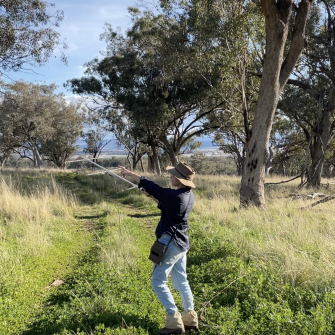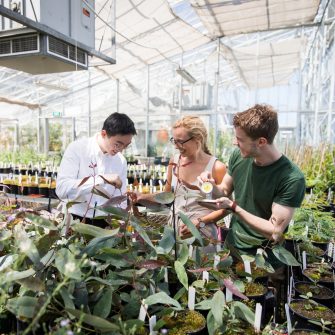Graduate Diploma in Science (Research)
- Commencing Terms
- Term 1, 2 & 3
- Duration
- 1 Year(s)
- Delivery Mode
- Face-to-face (includes blended)
- Campus
-
Kensington
- Codes
- Program code 5304
- CRICOS code 081526K
-
2026 Indicative first year full fee
- $40,000*
-
2026 Indicative full fee to complete degree
- $40,000*
-
2026 Indicative first year full fee
- $60,000*
-
2026 Indicative full fee to complete degree
- $61,000*

Application closures for 2026
International applications for all undergraduate programs, as well as postgraduate programs offered by the faculties of Arts, Design & Architecture, Engineering (excluding Master of Information Technology and associated programs) and Science are now closed to New Overseas Student Commencement (NOSC) for 2026 intakes.
Postgraduate programs offered by the Business School and the faculties of Law & Justice and Medicine & Health remain open. Master of Information Technology (and associated programs) also remain open.
- Overview
- Entry requirements
- What will I study?
- Future careers
- How to apply
- Fees & Scholarships
Overview
The Graduate Diploma (Research) will give you specialised knowledge and research training in disciplines within the Faculty of Science. You will be expected to complete disciplinary coursework (of 18-24 Units of Credit) and a significant independent research project (24-30 UoC).
You can choose from a diverse range of disciplines, so the exact proportion of research-based work and coursework may differ by School. In addition to conducting research and coursework, you will be expected to undertake Occupational Health & Safety (OH&S) training, attend and present seminars, and write a literature review and thesis.
Key features
Choose from a range of disciplines
Students will conduct research and complete coursework in a discipline of their choice, with UNSW Science offering a diverse selection of fields grouped into four key categories: Environmental Microbiology, Systems and Cellular Biology, Molecular Medicine, and Infectious Disease.
Hands-on training
During this degree, you’ll have the opportunity to learn practical skills in and out of the classroom through various training courses and seminars.
Apply knowledge to diverse contexts
Become an expert in your field and develop an in-depth understanding of biotechnology & biomolecular science. You’ll be exposed to future-focused learning outcomes which you can translate into real-world situations.
Why study at UNSW?
This degree will benefit those wishing to upgrade existing qualifications or to develop expertise in a different but related area from that of their first degree.
The Graduate Diploma in Science (Research) offers comprehensive research training, equipping students with advanced skills and specialised knowledge in disciplines within the Faculty of Science.
Want to see more from UNSW Science?
Entry requirements
To be admitted to the program, students typically need a bachelor's degree with a weighted average mark of 55–64 or higher in a related discipline. Some science disciplines may have additional entry requirements due to competitiveness and limited research places.
Applicants with substantial professional experience demonstrating research aptitude or significant disciplinary knowledge may also be considered. These applicants must provide:
A written submission detailing their experience and its relevance to research.
A statement of service from their employer verifying the role, responsibilities and duration of employment.
The application will be assessed by the Associate Dean (Education).
To apply for the Graduate Diploma in Science (Research), students should first contact the relevant School to discuss research projects, available supervisors and entry requirements. After identifying a suitable supervisor, they can apply online.
English language requirements
You may be asked to provide evidence of your English proficiency to study at UNSW depending on your educational background and citizenship. English language skills are vitally important for coping with lectures, tutorials, assignments and examinations - this is why UNSW requires a minimum English language competency for enrolment.
If you’re completing an Australian Year 12 qualification (e.g. NSW HSC or equivalent), you do not need to provide anything extra to prove your proficiency. Your qualification will be used as evidence of your English proficiency.
If you do need to provide evidence of your English proficiency, this will be indicated in your application. You can prove this by providing evidence that you meet one or more of the following criteria:
- English language tests and university English courses
- Prior study in the medium of English
- Other qualifications
If you need to improve your English skills before you start your degree, UNSW College’s Academic English Programs are for you. The programs are suitable for various English levels and help you prepare for university studies and life in Australia.
For more details, visit the English Language Requirements page.
To be admitted to the program, students typically need a bachelor's degree with a weighted average mark of 55–64 or higher in a related discipline. Some science disciplines may have additional entry requirements due to competitiveness and limited research places.
Applicants with substantial professional experience demonstrating research aptitude or significant disciplinary knowledge may also be considered. These applicants must provide:
A written submission detailing their experience and its relevance to research.
A statement of service from their employer verifying the role, responsibilities and duration of employment.
The application will be assessed by the Associate Dean (Education).
To apply for the Graduate Diploma in Science (Research), students should first contact the relevant School to discuss research projects, available supervisors and entry requirements. After identifying a suitable supervisor, they can apply online.
English language requirements
You may be asked to provide evidence of your English proficiency to study at UNSW depending on whether you are from an English-speaking background or non-English speaking background. English language skills are vitally important for coping with lectures, tutorials, assignments and examinations - this is why UNSW requires a minimum English language competency for enrolment.
If English is not your first language, you’ll need to provide proof of your English proficiency before you can be given an offer to study at UNSW. You can do this by providing evidence that you meet one or more of the following criteria:
- English language tests and university English courses
- Prior study in the medium of English
- Other qualifications
If you need to improve your English skills before you start your degree, UNSW College’s Academic English Programs are for you. The programs are suitable for various English levels and help you prepare for university studies and life in Australia.
For more details, visit the English Language Requirements page.
Check the specific English language requirements for this program
What will I study?
UNSW is introducing a new academic calendar from 2028.
We are moving to a new flex-semester calendar. What does this mean for your studies?
Full program structure
When you study a Graduate Diploma in Science (Research) you'll gain specialised knowledge and research training in disciplines within the Faculty of Science.
You'll complete disciplinary coursework and a significant independent research project. Due to the range of disciplines, the exact proportion of research-based work and coursework may differ by the program you choose to study.
In addition to conducting research and coursework, you'll complete Occupational Health & Safety (OH&S) training, attend and present seminars, write a literature review, and write a thesis.
You'll complete a specialisation in Biotech and Biomolecular Science. This specialisation includes study in applied sciences, human bacterial pathogens, hepatitis viruses, tissue engineering, cancer, bioinformatics, functional genomics, extremophiles, astrobiology, and more.
Research is grouped into four main disciplines:
- Environmental Microbiology
- Systems and Cellular Biology
- Molecular Medicine
- Infectious Disease
Future careers
Master your chosen scientific field and use your cutting-edge research conducted to drive innovation and advancement. With this graduate diploma, you could qualify for roles such as:
Biochemist
Biosecurity officer
Biotechnologist
Clinical research coordinator
Conservation scientist
Data analyst
Environmental scientist/consultant
Epidemiologist
Geneticist
Health policy advisor
Laboratory manager
Microbiologist
Pharmaceutical scientist
Public health officer
Quality control analyst
Regulatory affairs specialist
Research scientist
Science communicator
Technical writer
University lecturer/professor
How to apply
Applications must be submitted through our Apply Online portal. We encourage you to submit your completed application as early as possible to ensure it will be processed in time for your preferred term. Some high-demand programs and Faculties with limited places may have an earlier application deadline or commencement date. Find out more.
Ready to start your application?
For most international students, applications are submitted via our Apply Online service. We encourage you to submit your completed application as early as possible to ensure it will be processed in time for your preferred term.
Some high-demand programs with limited places, may have an earlier application deadline or may have an earlier commencement date. For details, visit the international admissions information page.
Ready to start your application?
Fees & Scholarships
*Fees are subject to annual review (or when required) by the University and may vary accordingly.
Indicative fees are a guide only and have been calculated based on the typical enrolment patterns of students undertaking the program. The indicative fees listed here is an estimate for tuition only and excludes non-tuition fees and charges. The amount you pay will vary depending on the calendar year of enrolment, the courses you select and whether your study load is more or less than 1 Equivalent Full Time Student Load (48 units of credit (UOC) per year).
You should not rely on indicative fees as fee increases are assessed when required and may exceed the indicative figures listed here. Actual fees are calculated on enrolment. More information on fees can be found at the UNSW fees website.
*Fees are subject to annual review by the University and may increase annually, with the new fees effective from the start of each calendar year. The indicative fees listed here are based on an estimated average and are for tuition only, other fees and charges are not included. The amount you pay will vary depending on the calendar year to enrol, the courses you select and whether your study load is more or less than 1 Equivalent Full Time Student Load (8 courses per year).
Indicative fees are a guide for comparison only based on current conditions and available data. You should not rely on indicative fees. More information on fees can be found at the UNSW fees website.
Indicative fees to complete the program have been calculated based on a percentage increase for every year of the program. Fee increases are assessed annually and may exceed the indicative figures listed here.
Indicative fees to complete the program include tuition plus an estimate of study-related costs of approximately $1,000 per year. To find out more about other costs, visit UNSW International.
Scholarships
At UNSW, we award over $83 million in scholarships each year. We pride ourselves on rewarding excellence and making university accessible to students from all walks of life. Whether you’re a domestic or international student, our range of scholarships, prizes and awards can support your journey.
Progress starts here – at a world-leading university

Top 20 Worldwide
UNSW is ranked #20 university in the world
QS World University Rankings, 2024–2026

Most Employable Graduates
Winner of the AFR Most Employable University Award seven years in a row
AFR Top100 Future Leaders Awards, 2020–2026

Australia's #1 for Innovation
Highest number of startups and spinouts from university-developed tech
SCOPR report, 2024






